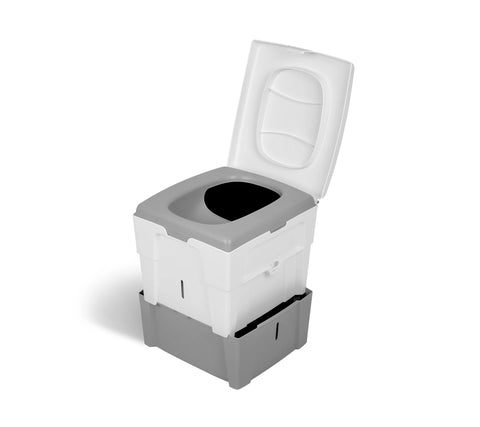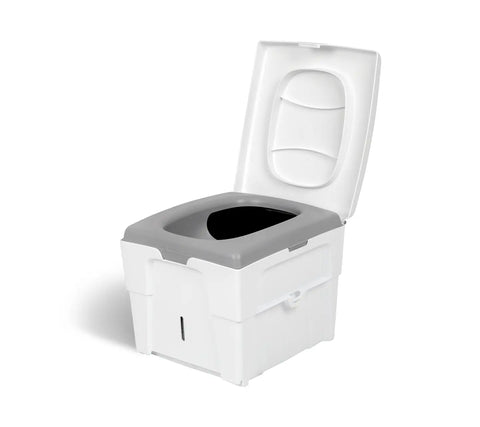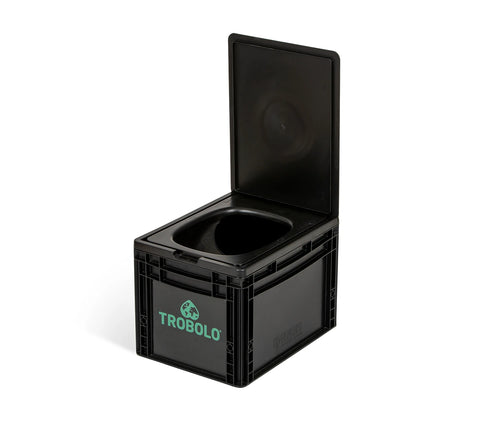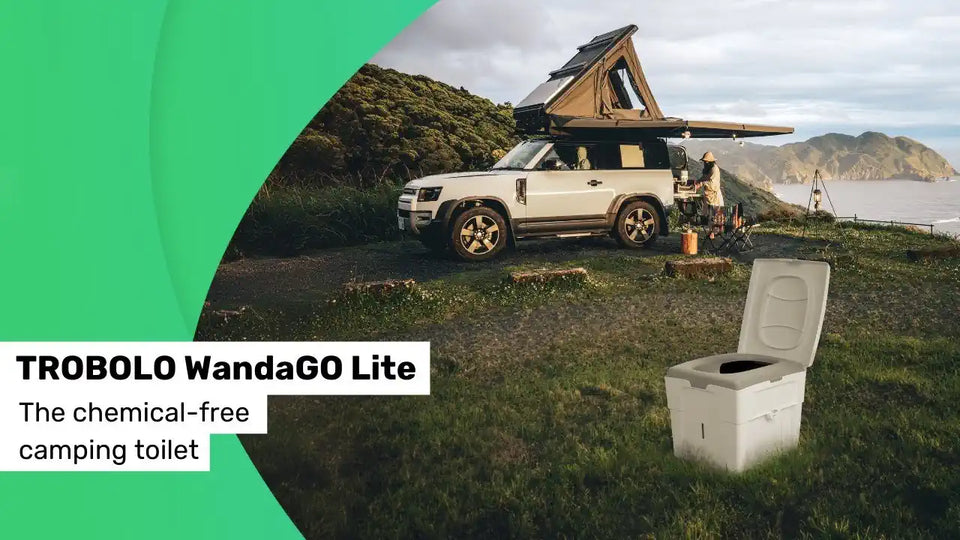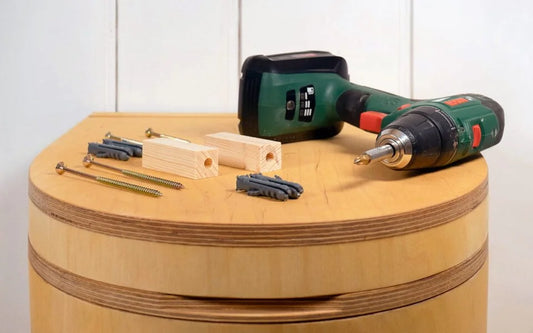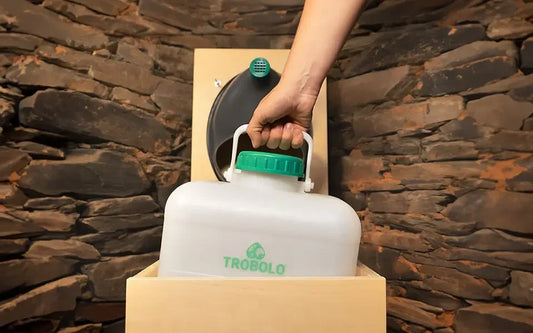Our camping toilets at a glance
A loyal companion
Why is a portable camping toilet worth it?
Packing a camping toilet for camping, tenting and possible toilet emergencies might not be the first thing that comes to mind, but it offers numerous advantages.
When camping at a site, there are often sanitary facilities available, but their condition can be uncertain. Having your own camping toilet ensures better hygiene and reduces the risk of coming into contact with germs from other campers.
For those opting for a remote camping adventure in the forest or mountains, access to toilets is usually unavailable. Relieving oneself in nature is not only uncomfortable but can also harm the delicate ecosystem depending on the location. Additionally, some regions have legal regulations prohibiting the disposal of any waste, including human excrement.
A camping toilet thus provides a comfortable, hygienic camping experience without impacting the environment.
These are your options
What types of camping toilets are there?
A camping toilet needs to meet specific requirements. Ideally, it should be easy to transport, simple to use, and offer a high level of comfort and hygiene. Most campers opt for one of the following types of camping toilets:
- Chemical toilet
- Bucket toilet
- Composting toilet
Each of these toilet systems has its own set of advantages and disadvantages. In the following sections, we will introduce the different types of camping toilets one by one.
Chemical toilet as camping toilet
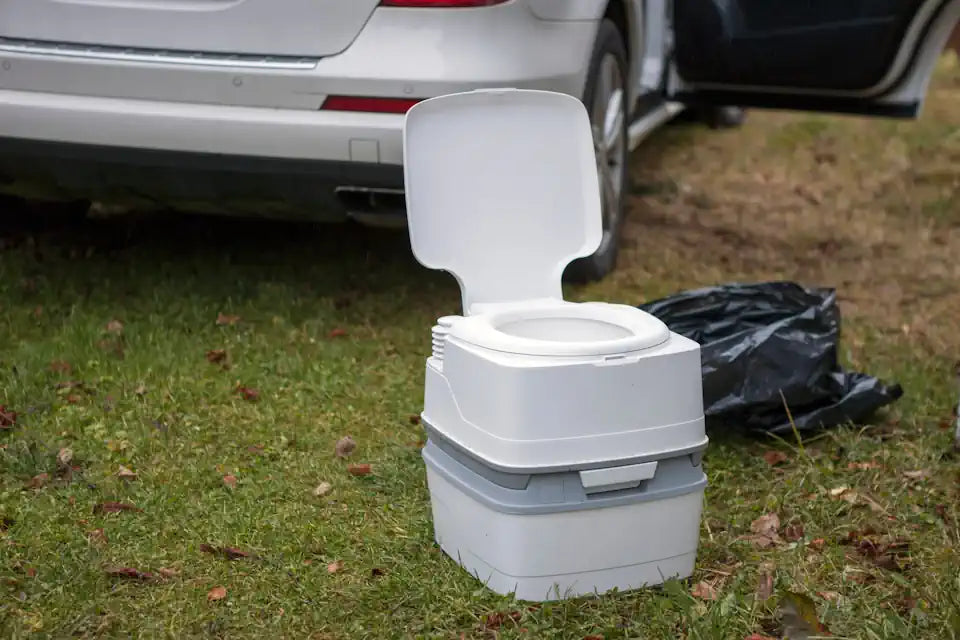
Chemical toilets refer to all toilet solutions that require chemical additives for use. They are available built into vehicles or with separate toilet cabins, such as on construction sites or at festivals.
For camping and tenting, small, portable chemical toilets are particularly suitable. These chemical toilets do not need to be permanently installed; instead, they can be easily stored and set up wherever needed.
It is important to always have enough chemicals on hand to ensure the proper functioning of the chemical toilet. When the chemical toilet is full, it must be emptied at a suitable disposal station. Such disposal stations can be found at many, but not all, campsites. Emptying the toilet also requires gloves and a strong stomach, as the mixture of feces, urine, and chemicals can be quite unpleasant even for the most tolerant individuals.
Our conclusion on chemical toilets: Chemical toilets allow for mobile toilet use during camping and tenting. However, the main drawback is the unpleasant task of emptying the waste. This task is so disagreeable that many users end up using the chemical toilet only in emergencies to avoid having to empty it. The reliance on chemicals is another disadvantage of chemical toilets.
Pros:
- Mobile toilet use without connections
- Works without electricity
Cons:
- Unhygienic emptying and disposal
- Emptying only at disposal stations
- Chemicals necessary
Bucket toilet as camping toilet
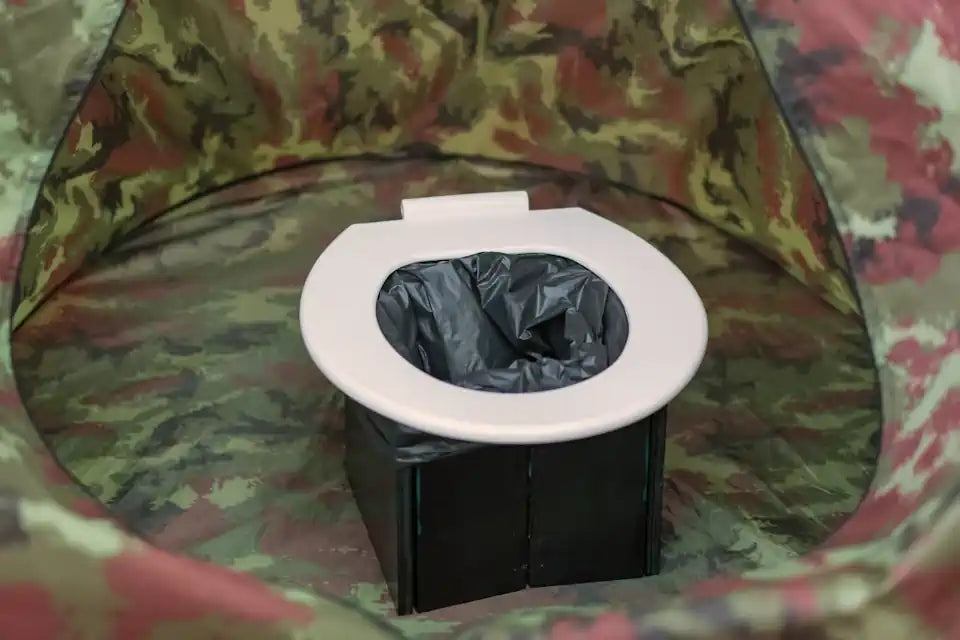
A bucket toilet is essentially just a bucket repurposed as a toilet.
Options range from basic buckets from the hardware store to modified buckets equipped with a toilet seat. Sitting on a bucket toilet is generally uncomfortable, although models with a toilet seat do offer a minimal level of seating comfort.
Since feces and urine mix in a bucket toilet and no chemicals are used to control odors, it’s advisable to empty the bucket after each significant use and clean it thoroughly.
Our conclusion on bucket toilets: A bucket toilet is a cost-effective, simple solution but sacrifices a lot in terms of comfort. The frequent and unhygienic emptying is also a downside. Overall, a bucket toilet is best viewed as a last-resort option and does not provide comparable comfort to a regular home toilet.
Pros:
- Mobile toilet use without connections
- Works without water, electricity and chemicals
Cons:
- Unhygienic emptying and disposal
- Emptying after every visit to the toilet
- Hardly any comfort
Composting toilet as camping toilet
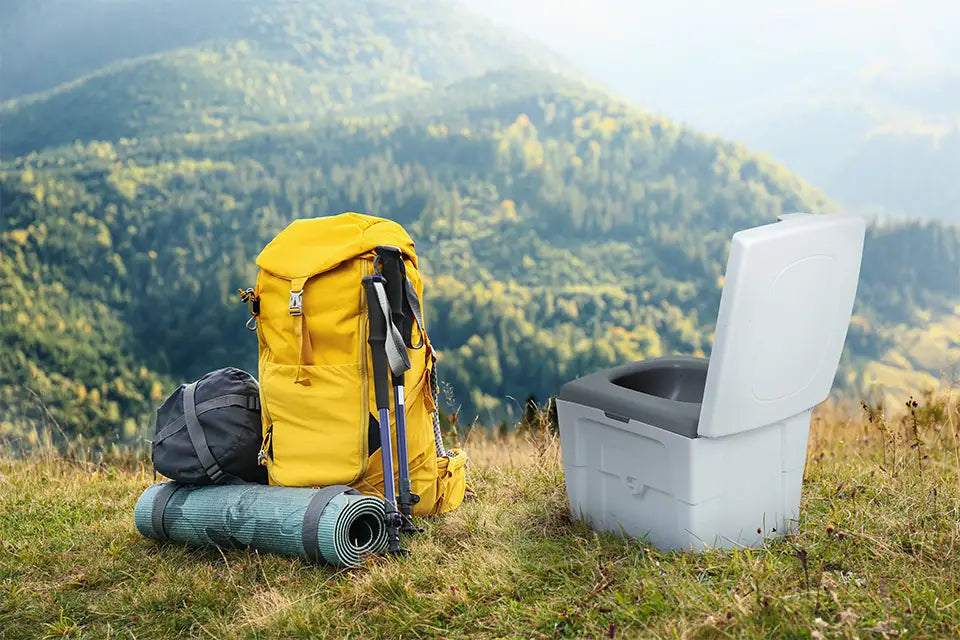
A composting toilet separates solid and liquid waste, which minimizes odor development and greatly simplifies the emptying and disposal process.
Feces and urine are collected and disposed of separately. Solid waste, which ends up in an inlay, can be collected and disposed of with the regular trash, much like used diapers. Liquid waste can be flushed away through a conventional toilet, for example.
Sitting on a composting toilet is generally comfortable, as it is not a spartan solution like a bucket toilet but rather a professional sanitary option. This makes it an ideal outdoor toilet for remote or eco-friendly locations.
Our conclusion on composting toilets: Composting toilets are unbeatable in terms of comfort for camping and tenting. Using them is as comfortable as using a regular toilet. Additionally, their emptying and disposal are straightforward and hygienic. Furthermore, composting toilets are odorless during use, and models specifically designed for camping impress with their compact size, lightweight, and high durability.
Pros:
- Mobile toilet use without connections
- Works without water, electricity and chemicals
- Hygienic emptying and disposal
- Odourless in operation
Cons:

Disposal made simple
Emptying the different types of camping toilets
When it comes to emptying, there are also clear differences between the various types of camping toilets. A bucket toilet is simple in design but requires the most effort. As the name suggests, urine and solid waste end up together in one bucket, which immediately causes unpleasant odours. The bucket must therefore be emptied frequently and thoroughly cleaned. This process is far from hygienic. You can dispose of the waste directly via a regular toilet or a disposal station, as the mixture of urine and feaces cannot be thrown in the trash. Overall, handling a bucket toilet is quite labour-intensive and very unpleasant.
A chemical toilet, on the other hand, seems more convenient at first glance because it breaks down liquids with chemical additives, which slightly reduces odours. In practice, however, this means you are only allowed to empty the toilet at special disposal stations. These stations are not available everywhere, and emptying the toilet is still unhygienic due to chemical odours and the risk of splashing. Additionally, it is recommended to thoroughly clean all parts after each emptying to avoid residues and bacteria.
Emptying a separation toilet is much simpler and cleaner. Since urine and solid waste are collected separately from the start, the contents remain virtually odour-free and can be disposed of hygienically. You can empty the urine via a regular toilet or a suitable drain. If you want to take it home, you can also use it in diluted form as fertiliser in the garden. The solid waste can be composted or disposed of with the rest of the trash. This way, you not only save a trip to a disposal station but also have a long-term clean, environmentally friendly, and low-maintenance solution for your toilet use on the go.
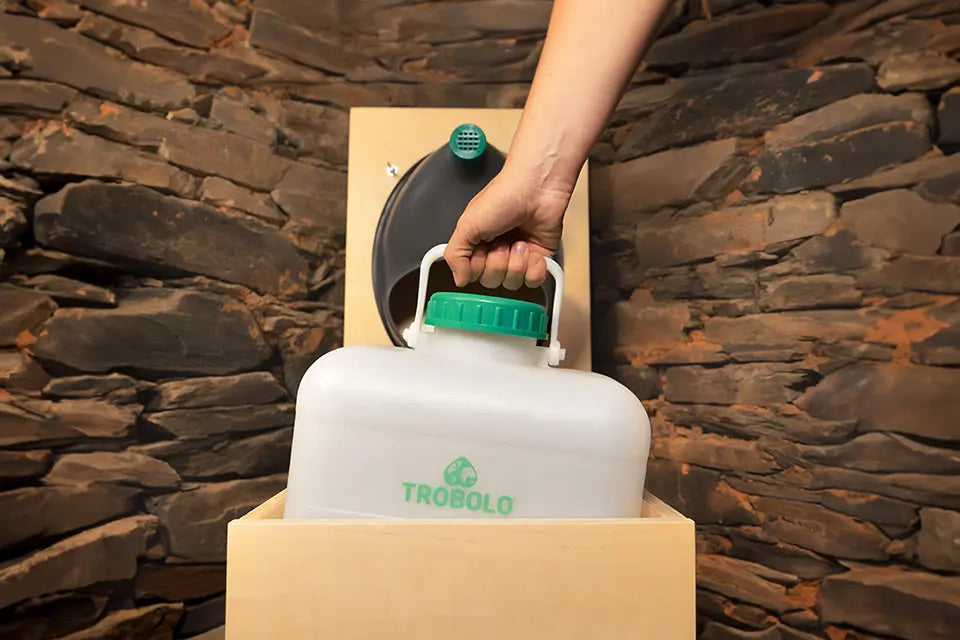
Easy, comfortable and affordable
Which is the best camping toilet?
In order to answer the question, let's take a look at the following table, that gives a summarized overview of the three camping toilet types - chemical, bucket and composting toilet - and highlights their main aspects:
As you can see, a composting toilet performs significantly better than chemical or bucket toilets in most cases. Composting toilets are not only more comfortable to use but also make the disposal of waste much easier. They are a tool that greatly simplifies camping trips, whereas chemical and bucket toilets tend to have the opposite effect.
For camping, lightweight composting toilets made from durable materials are especially suitable, such as our TROBOLO WandaGO, WandaGO Lite, or TROBOLO BilaBox. These models are also equipped with our unique TROBOLO SafeShell System®, which protects the liquid container from odors and prevents spillage during transport. Thanks to their compact size, these camping toilets can be stored anywhere and serve as reliable companions on any camping trip.
Have a look
The TROBOLO WandaGO Lite in action
Take it into your own hands
Building your own camping toilet?
If you want, you can even build your own camping toilet. With our TROBOLO accessories, DIY projects become a breeze, and you can design your composting toilet exactly as you envision it. Here’s how you can build your own composting toilet.
Conclusion
Composting toilets are ideal camping toilets
A composting toilet with a separation mechanism allows for comfortable toilet use anywhere. This makes the composting toilet the perfect companion for camping and tenting.
Our camping toilets are lightweight and compact, so they can be transported and repositioned flexibly. Using them is comparable to using a regular toilet, and our toilets are completely odor-free during use. Even emptying and disposal are straightforward, as solid waste, along with the inlay, can be disposed of with regular trash, and liquid waste can be directed into a conventional toilet. You don’t need to rely on disposal stations, making the entire process clean and hygienic.
Overall, a composting toilet offers the highest level of comfort for camping and has a clear advantage over other solutions like chemical and bucket toilets.









